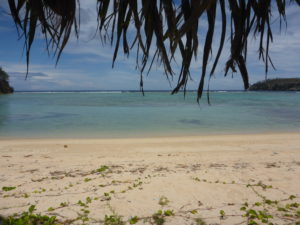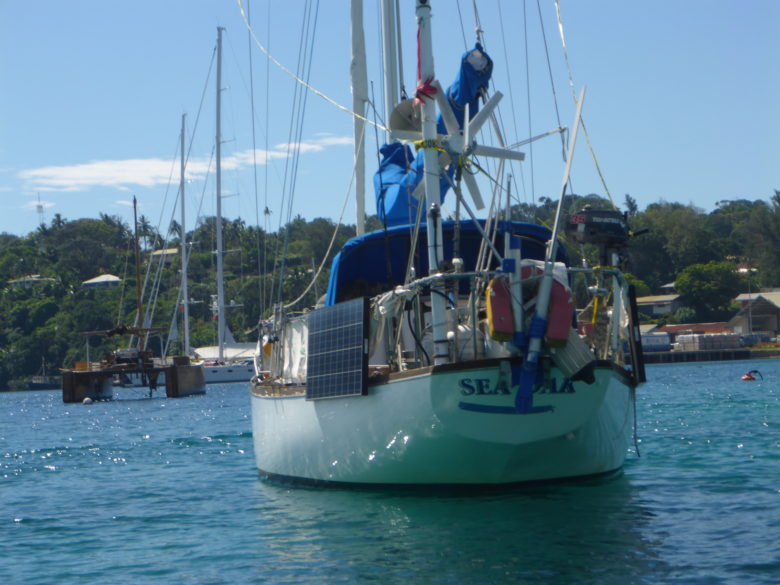“Sea Oak isn’t on her mooring Barb,” Rob commented as we motored past the little black ball.
As the large police launch left the quay to assist in the pursuit of Florida born Dean the wrong co-ordinates were given to the skipper and he set off in a North West direction, while Sea Oak was heading east and being pursued by the smaller police launch. Dean fired four flares at the launch threatening their lives and by this time, low on fuel they had to return to Neiafu empty handed and nearly empty tanked, leaving Sea Oak to continue her escape.
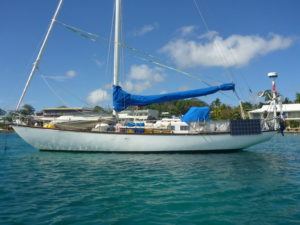
Yesterday, while this was happening we had just rowed ashore and were in town when I noticed a large, new white Toyota gliding along the street loaded with four big white shirted very official looking Tongans aboard. How and when the car was delivered here was a mystery as it stood out like a sore thumb against the local ancient automotive wrecks. Could they be investigating the open prison policy on the island?
Back to our story. On Monday we walked the mile or so across town and over the local hill to the recently opened boat yard. Alan and Joe are using what was a quarry, started by the Chinese Aid group years ago. It is an ideal hurricane hole for yachts as the sheer walls carved out in the quarrying process offer protection from the winds.
They had a successful year last year and already have more boats booked in this year. “We want to provide an alternative to cruisers turning left for New Zealand after their season here, to save them that slog if they want to spend the next season here anyway. Fiji is now turning cruisers away who want to hole up with them.” In what are called ‘graves’ where the yacht is lowered into a hole so her keel is below ground level thus preventing the risk of being blown over.
We have arranged for Zoonie to be lifted out at high tide on 10th October and returned with a spotless hull and new anodes the next day for a cost of £270.
Alan also offered to help check our electrical system to see where we might be losing stray power from the batteries. Having a clean hull will speed up our clearance in to NZ as we shouldn’t have any new growth, including the dreaded Mediterranean Fan Worm, in the short 1100 mile trip down there.
On our walk back to town we called in to the Government Office for a meeting with Customs from Nuku Alofa, the capital of Tonga to the south, and local business people and cruisers alike.
We were the only cruisers there. The Tongan Government had just passed a new law that means businesses in the tourism industry can import goods associated with their business up to a value of $100,000 without paying import tax. That figure was $20,000, so there was a polite rush of happy surprise in the room when they heard that.
Later on in question time Rob mentioned how that was indeed good news but to keeps tourists, in particular yachties, coming they had to do something about the negative practice of perks being demanded from new visitors. He told the experience we had with the wine and our friends had with the chocolate bar. The head of Customs apologised profoundly for the way we were treated, and after the meeting concluded the local Customs chief came over to us and asked us for the details.
We also pointed out we had received no receipts for the money we handed over. We agreed to take all the documents we had been given, The Health Practique with $100 scribbled at the top and the Conveyance Inspection Report with $22 at the top, both with the word ‘paid’ written beside them, to the office to have them photocopied so he could investigate.
We will probably hear no more and Graham may be suspended for a couple of months and then re-instated in a different role, to work out how he can defraud the government in some other way, but hey that’s not new is it!
Rowing slowly back through the mooring field we stopped for a chat with our neighbours, Miriam and Geoff aboard a beautiful double ender from California called Enough. “Did you feel the earthquake yesterday?” Miriam asked. I recalled Zoonie rocking a little and thinking that’s strange as there was no other vessel moving around us. In the packed church Sabine said Hannes had told her if it shakes again (the church!) we make for the door.
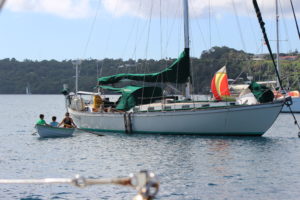
Miriam went on to tell us Fiji also felt it and put out a tsunami warning that was later withdrawn. At the same time a hurricane had hit a town on the US west coast and destroyed the marina they had been in a few months ago, sinking seven boats.
In our cooling swim around Zoonie we noted the cloudiness of the water after the vibration disturbed the sea bed.
The next morning, Tuesday, dawned blue and beautiful on our ‘scooter to the gardens’ day.
We were introduced to the heavy old beasty, “It’s in perfect running order but I want to see you get it off and onto its stand,” Sandy ordered us. We huffed and puffed and pulled and finally succeeded, what if we hadn’t I wondered.
“You’ll be stopped if you don’t where these,” she retrieved two decrepit crash hats from the piles of dusty junk and we were ready. “It’s a one way street outside, against you, but don’t worry, there’s not much about this time of day.” Sod’s law and just as Rob got the beasty moving a big 4×4 comes breezing around the corner towards us. It stopped dead fearing we might be worse off if it didn’t and we wobbled around the grinning driver onto the main road.
The drive over there was lovely in our own personal breeze, passing little homes in all stages of well-kept to derelict and all set in their own generous plot of land. Small scale copra production, and neat vegetable plots gave way to larger taro and coconut plantations and then some virgin forest. The island used to have many saw mills but now all the mature and useful trees for building have gone along with the saw mills.
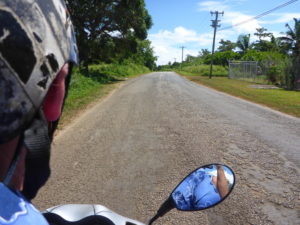
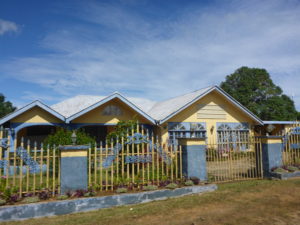
The practice of keeping ones friends close and one’s dead even closer, like in the front garden, that we saw on Bora Bora and Niue is not prevalent here. Near every pristine little church is a small graveyard of fenced graves pilled over with gravel. Into the gravel individual brightly coloured plastic flowers are ‘planted’ making a bright and gaudy display.
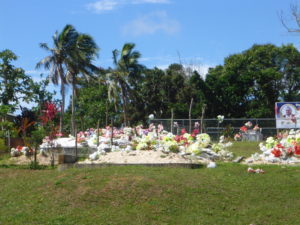
We pulled up at the end of the road just under the sign for the gardens and a kind Tongan came out of his cab and helped us pull the beasty onto its stand.
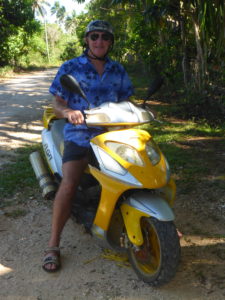
He was waiting by the public walkway Haniteli has fenced off for them to give access to the reef where families work at low tide securing handfuls of long pandanus leaves under coral rocks so the sea will bleach the inner fibres for use in the lucrative matt weaving industry.
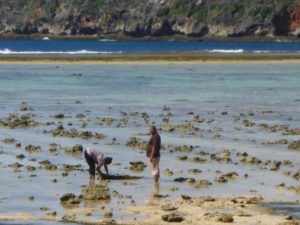
I could write a book about what Haniteli told us. The wearing of these mats is a Tongan Tradition and they are presented as gifts at Weddings and Baptisms and become valued heirlooms. The diaspora of Tongans who have left their homeland to live abroad place pre-orders for them which amount to the country’s second most lucrative income. All over the island ladies weaving groups are constantly busy weaving in company and many Tongans wear the mats on a daily basis not just for special occasions. We wondered if it is the same or a similar plant to the one used for panama hats.
The greatest income comes from expats sending $208 million home to family each year from the US, Aussie and the 65,000 in NZ alone. Finally tourism and the weather dependant vanilla and coconut product industries complete the earned income of the islands.
“I’m not a religious man but I was sent to Sunday school as a boy. I read the bible and for me I liked the stories best, especially the one about the Garden of Eden, so I decided to create my own here on earth when I was given 8 acres. I wanted to create a place that would benefit mankind and Tonga alike.”
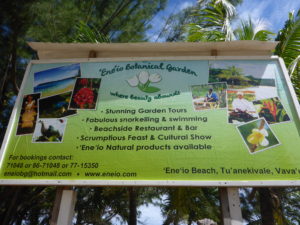
“I was 8 years old and my father helped me claim the land, as we had to, by fencing it securely and then planting 200 coconut palms. He dug the holes and I planted the trees.” Haniteli stroked the bark of one such tree as it loomed high above him.
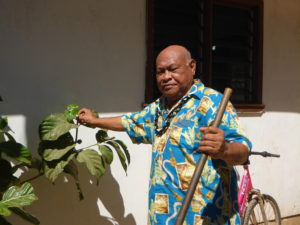
“That was in 1954. I was the first Tongan to gain a degree in NZ and then I worked as chief minister in the FAO, (food and agriculture organisation) for 38 years, working with my garden when I could.”
“I was so happy when they brought the retirement age from 65 down to 60 and I could retire and spend my time in my garden.” I explained how I had found it hard in the UK when they put women’s retirement age up by two years after a lifetime of looking forward to retiring at 60. He was empathetic.
A charming young couple had joined us and I guessed correctly they were from Sydney. The young lady’s pretty Australian dialect made me imagine a conversation with Kylie Minogue.
Haniteli went on to explain that to be a ‘Botanic Garden’ one has to label in detail all the plants and have a database, with this in place he opened the gardens in 2006 and has since had not only royalty but the likes of National Geographic visit him. The trails through the garden are named by the individuals and companies who help sponsor his project.
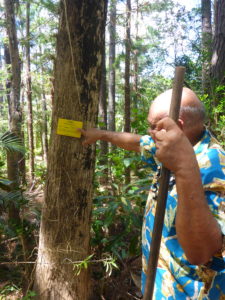
Out of the 35000 specimens present not all were gained honestly. One Sunday morning when a particular family was at church, a short, rotund figure could be seen bent over collecting seeds from a significant fallen tree and thanks to him its descendants are thriving.
Nor has his fascinating enterprise always received the recognition it deserves. While on a FAO visit to Japan, a dignitary asked Haniteli what he did in Tonga. When Haniteli told him he fell about laughing. “You cannot possibly have a Botanic Garden in Tonga.” Haniteli felt flattened and small. So he showed this man his database at which point the Japanese fellow bowed repeatedly, palms of his hands flat together, to apologise.
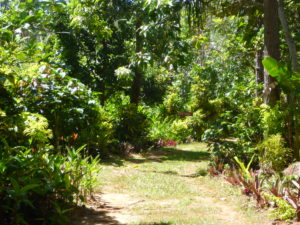
Alighting from the driver’s seat Haniteli would come around and collect his long stick and delight in telling us all about his plants and trees. Both our Sydney companions had upset stomachs after their ‘swimming with whales’ trip the day before, so he set them to chewing a particular leaf, having given us all a switch of mock orange to swat away the mosquitos.
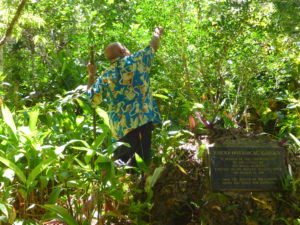
The different species of plants are scattered throughout the estate so they will be less recognisable to any passer-by with an eye to steal them. A Teak tree nestled amongst fruit trees and medicinal plants rubbed shoulders with plants used by Chanel in their perfume production. A voracious chicken killing Kingfisher screeched as it flew through the swaying palms, the tallest of which are over 100 years old and are tough enough to survive the worst cyclones.
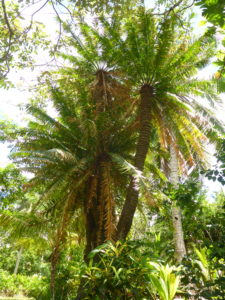
Haniteli explained how useful the Taro and Kava plants are. I bought a bunch of taro leaves in the market, tied neatly with white shiny tape. The lady explained that after boiling they tasted like spinach. A grimace spread over Haniteli’s face when I said I had tried a bit raw, as one does, and found it burned the area it touched within my mouth. He explained the chemical reason why this had happened. The root of the taro is what Ian deep fried over his charcoal in the market. We also had them with breadcrumbed fish for lunch and they were delicious.
Vanilla vines climbed like skinny lizards up a tree and over a stump.
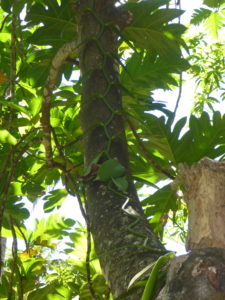
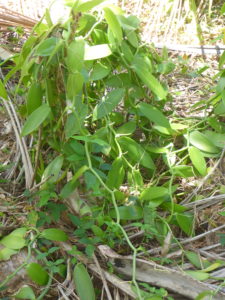
Looking whimsically from our dining table, over the lovely waves breaking on the reef that fronts his beach Haniteli explained how he washes by swimming each day and then spreads himself with health giving coconut oil. He pointed to an area further round the beach where an area of the reef had been cleared of rocks. “That is the swimming pool and you are very welcome to swim and snorkel there, it’s really lovely.”
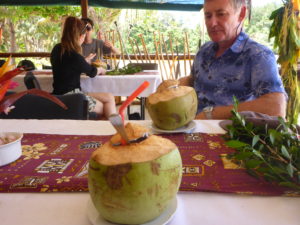
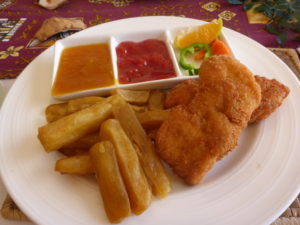
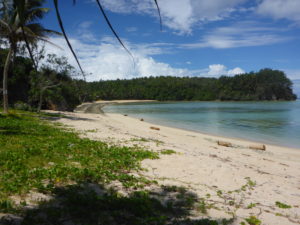
Well we could see that for ourselves and took him up on the offer, while he slept on the cool tiled floor of his reception after his mornings work and 3 Heinekins.
